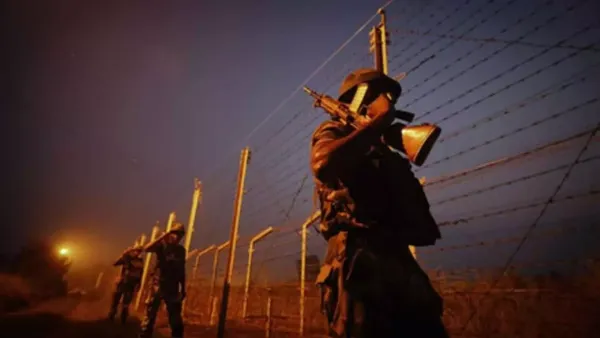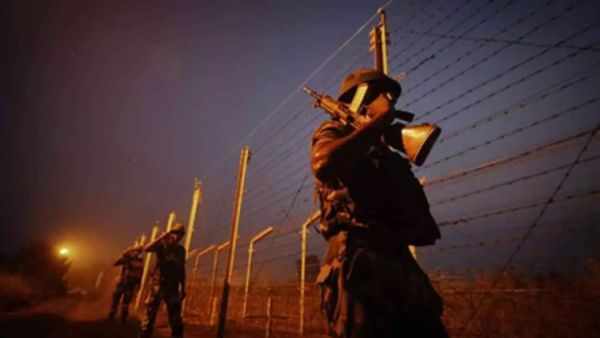
According to Indian Army authorities, during the intervening night of May 8 and May 9, the Pakistan Armed Forces carried out many strikes along the whole Western border using drones and other weapons.

Along the Line of Control in Jammu & Kashmir, Pakistani soldiers also engaged in a number of ceasefire violations (CFVs).
The Indian Army claimed in a statement that the drone strikes were successfully repelled and that the CFVs received a suitable response.
The Indian Army is still dedicated to defending the country’s territorial integrity and sovereignty.
The Indian Army also said that it will react with force to any malicious schemes.
The Pakistani military’s effort to attack military installations in Jammu, Pathankot, Udhampur, and other places was foiled by India on Thursday evening.
In addition to destroying drones and missiles, New Delhi’s counterattack took down Islamabad’s Airborne Warning and Control System (AWACS) aircraft, severely impairing Pakistan’s ability to coordinate the battlefield and conduct air surveillance.
According to the Headquarters Integrated Defence Staff (HQ IDS), the Indian Armed Forces have successfully thwarted a massive drone and missile attack by Pakistan that targeted several military installations in Northern and Western India, including Jammu, Pathankot, and Udhampur, amid the rising tensions between India and Pakistan.
The HQ IDS said in a post, X: “Pakistan uses drones and missiles to attack the military stations of Jammu, Pathankot, and Udhampur near the international boundary in Jammu & Kashmir. No losses. #IndianArmedForces used both kinetic and non-kinetic methods to neutralize the threat in accordance with regular operating practice.
Following India’s Thursday morning targeting of Pakistani air defense systems in many locations, including the “neutralization” of one in Lahore, Pakistani troops resumed their efforts and intensified their shelling of the Line of Control and the International Border in Jammu and Kashmir, Punjab, and Rajasthan.
In line with standard operating procedures (SoP), the Indian military neutralized the danger utilizing both kinetic and non-kinetic measures in a prompt and decisive response.
As New Delhi responded to the “original escalation” sparked by the Pahalgam massacre, Foreign Secretary Vikram Misri stated that Pakistan alone can determine whether it wishes to de-escalate tensions with India, while the Ministry of Defence reaffirmed that any attack on military sites in India will invite a “suitable response.”
Drones were seen from across the border, prompting the implementation of blackouts in a number of cities and towns in Punjab, Rajasthan, and Jammu & Kashmir.
During a press conference held by the Ministry of External Affairs, Colonel Sofiya Qureshi affirmed that the strikes had been effectively repelled by India’s Integrated Counter-UAS Grid and Air Defence systems.
“The Indian Armed Forces attacked many Air Defense Radars and installations in Pakistan this morning. India’s retaliation has been as intense and in the same area as Pakistan’s. An air defense system in Lahore has been neutralized, according to trustworthy information,” Colonel Qureshi said.
Awantipura, Srinagar, Jammu, Pathankot, Amritsar, Kapurthala, Jalandhar, Ludhiana, Adampur, Bathinda, Chandigarh, Nal, Phalodi, Uttarlai, and Bhuj were among the military objectives that Pakistan tried to attack during the night of May 7 to May 8.
All attempted invasions were, however, neutralized by India’s strong air defense systems, and the assaults are being confirmed by the recovery of debris from intercepted drones and missiles from various locations.
According to defense authorities, the missiles were directed against strategic sites such as Satwari (Jammu Airport), Samba, R.S. Pura, and Arnia.
Following two deafening explosions, which were probably caused by the interception of invading drones, a sudden power failure plunged Jammu city into darkness. Soon later, sirens sounded all around the city, warning terrified citizens to take cover.
Massive explosions were heard in Jaisalmer, and authorities said that a blackout had been imposed in the regions of western Rajasthan that border Pakistan, leaving the whole area in complete darkness.
The escalation came after India responded to the April 22 terror assault in Pahalgam that claimed 26 lives by launching Operation Sindoor, a series of targeted and accurate attacks on nine terror camps in Pakistan and Pakistan-Occupied Kashmir (PoK).
“We have taken targeted, methodical, and non-escalatory measures. There have been no attacks against Pakistani military installations. The Ministry of Defence said on Wednesday that India had shown a great deal of prudence in both the choice of targets and the manner of execution.
Colonel Qureshi reaffirmed at Thursday’s media briefing that India had made it clear on May 7 that any assault on Indian military assets would be met with a “suitable response”.
The Union government held an all-party conference at the Parliament Annexe on Thursday to update political leaders on the security situation and India’s measured military response in the wake of Operation Sindoor.
Union Home Minister Amit Shah, BJP President J.P. Nadda, Congress President Mallikarjun Kharge, and Leader of the Opposition in the Lok Sabha Rahul Gandhi were among those present at the briefing, which was chaired by Union Defence Minister Rajnath Singh.
Following the all-party meeting, Wing Commander Vyomika Singh, Colonel Sofiya Qureshi, and Foreign Secretary Vikram Misri also spoke at the news conference.